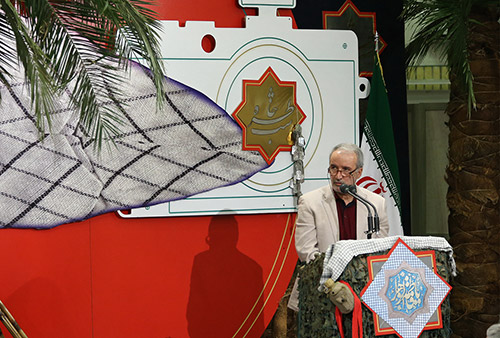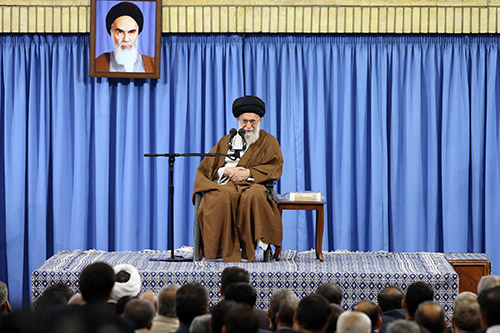Whatever has really happened should be narrated
Translated by M. B. Khoshnevisan
2017-06-06
On the occasion of the 35th anniversary of the liberation of Khorramshahr, the third program of the Memory Night of the Sacred Defense was held in presence of the Supreme Leader of the Islamic Revolution Ayatollah Seyed Ali Khamenei in Imam Khomeini Hossianieh on 24th of May 2017, according to the website of Iranian Oral History.
In the beginning of the ceremony, Morteza Sarhangi, the founder of the Office of the Resistance Literature and Art of the Art Center, Abolfazl Kazemi, the author of “Koocheye Naqashha” (The Painters’ Alley), Asqar Naqi Zadeh, a war veteran and Sacred Defense movies actor, Mehdi Tahnian, a war veteran and the narrator of the book “Sarbaz-e Koochak-e Imam” (Imam’s Little Soldier) and "My Entire 13 Years Old", Mashallah Shahmoradi, a war veteran and director for “Rojan” TV series, Mamoosta Mollah Qader Qaderi, the Friday Prayers’ leader of the town of Paveh, Ali Khosh Lafz, a war veteran and the narrator of the book “Vaqti Mahtab Gom Shod” (When the Moonlight Went Missing), Alireza Moradi, the retired army colonel, Ebrahim Hatami Kia, the director of Sacred Defense movies, and Maryam Katebi, an aid worker during the Sacred Defense era and a comrade of missing commander, Ahmad Motevasselian narrated their memoirs. Also, in this program, the youths of the “Nasim-e-Qadr” vocal group performed the song “Arghavan” (Violet) on the Defenders of the Shrine volunteers active in Syria.
According to the Office of the Supreme Leader of the Islamic Revolution Ayatollah Seyed Ali Khamenei, in continuation of 3rd program of the Memory Night of the Sacred Defense, the Supreme Leader of the Islamic Revolution made important remarks in a meeting with a group of commanders, war veterans, artists and those involved in the production of events for the Sacred Defense memory recitation nights. The full text of the Supreme Leader's remarks is as follows:
In the Name of God, the Most compassionate, the Most Merciful
The meeting is a sweet, articulate, full-of- thought and useful one; I do not mean the person of the meeting but the current of these meetings that you did your best and created the meetings of the Memory Night as a lasting move, and today thanks God, I found the opportunity to sit, hear and benefit. It was very good, and we benefited a lot. However, the memoirs of people like me are not important, because as he – Mashallah Shahmoradi – said, when Khorramshahr was conquered, he heard the news in Kermanshah and we also heard in Tehran. Of course, it is good to say this – now I don't remember whether the news had been announced from the radio, martyr Sayad contacted me in the Presidential Office and informed me with some details. He said, "Now that I am talking to you, the Iraqis have queued to be captured", it was an interesting interpretation – on the same afternoon, I got in immediately to visit Imam Khomeini (God bless his soul) which of course, the streets was full of people who expressed kindness and happiness. I went and told the Imam the same interpretation. I said Mr. Sayad says the Iraqis have queued to be captured; a long queue of some ten to fifteen thousand Iraqis! Our memories are not important, but the memories of those brothers and sisters who were involved in the war for a long period are very important.

In my view, this war – this Sacred Defense – besides the losses it had for us, had also great benefits and interests; these benefits are very higher and greater than its losses. Our losses in the war consisted of human and material ones, namely the youths we lost, the families who lost their loved ones, all of us mourned for these young men, and we also had material losses, the country fell behind in terms of the appearances of construction to some extent in a period, these were the war's losses. All of wars have such losses. But the benefits of the war were the long-run and lasting ones. However, it also had short-run and close benefits. The preservation and promotion of the revolutionary spirits in the society and the sustenance of the revolution is one of the effects of that era and had it not been for that struggle and sacrificial move, the revolutionary spirit would certainly have been exposed to threats. Yes, the honorable Imam was present and his character was a character which guaranteed lots of things; but the threats were heavy ones; certainly, the revolutionary spirit was exposed to threats. The revolution became enduring through presence in the scene of the Sacred Defense.
Another benefit was that we ourselves experienced one more time this thought of defending the national identity and religious and revolutionary identity – which we have said and heard and narrated many times that God Almighty helps the human to overcome the obstacles existing in the right way; it is very important. Any society moving toward progress naturally faces obstacles and challenges and if this society is in possession of spiritual aspirations that are against hunger for power and worldly matters, there will certainly be more obstacles, and in such a society practical trust in God and belief in the capability to overcome obstacles is very important. Yes, in narrations and the ayahs (of the holy Quran), we read and quote "trust in God" and the likes and believe in it, but it is very different to see it in deed. Hazrat Ibraham with all the grandeur said to God Almighty, "Show me how Thou givest life to the dead". God says "Do you not believe?" He replied, "Yes, but my heart may be at ease." This peace of heart, this acceptance of reality from the bottom of heart is very important; the war - eight-year defense- showed this to us. The Islamic Republic can now claim victory over all of the challenges it faces, because it has the experience of prevailing over numerous and tough hurdles in the Sacred Defense era. God says in the holy Quran, "And be not infirm, and be not grieving, and you shall have the upper hand if you are believers." If the faith in hearts and trust in God exist in practice, even mountains would level out before such a resolve and will not have the capability to resist it. This was one of the benefits of the war for us. And these are the realities.

Of course, the benefits of the war are more than these; now, these are analytical words and the likes that we do not want to spend time to such things. This blessed event, this huge event and really unbelievable in the view of we simple and shallow persons happened in our country; we did not have nothing at the outset of the war; I should tell you that we had nothing; empty handed; we had shortage of weapons; they were also imperfect and inaccessible. Some of the available items in our stocks had not been used till a long time after the beginning of the war; I was in the counseling office in the general staff and we were exposed to the coming and going of the military personnel; there were committed and faithful young people in the army. They came and reported us; and I as the representative of the Imam followed them up. They came and said that we have artillery named 203mm artillery which is heavier than our artilleries and this has not been used; it has not been said at all. In such a war with the tools the enemy has, we have a weapon that we could use but did not. I brought up the issue in our own meeting, in the meeting we had with these misters - Bani Sadr and others. Bani Sadr did not know anything too; some others did not like such things to be brought up. Then, one of the martyred commanders – may God bless him – who was present in the meeting said, "Yes, we have such weapon, this is very important." We said, "Why don't you use it?" I mean such weapons existed but were not used. In Ahwaz, a young serviceman came and informed us that we have new armored vehicles known as BMP-2 in the barracks of the Division 92 (of Ahwaz) which was later given to us. It was repeated many times that we needed such and such weapon but they gave negative answer to us. One morning, I got up and went to the barracks with the same person – the same young serviceman. Since we could not enter from the main gate, we arrived in the barracks from another way and saw yes! There were some 9 to 10 brand-new BMPs in the barracks; which of course they had been exposed to wind and rain since they were in the open-air! We had such a situation in the beginning of the war. We had no warfare tools; we had no or at least very few regular and prepared forces. We had few things like this which were not used; because there were a person or persons at the top who were not sympathetic; we advanced under such conditions; the things I said was related to the second half of the [Persian calendar year] 1359 (1980) namely the first six months of the beginning of the war.
Well, from the second half of the [Persian calendar year] 1359 (1980) to early 1361 (1982), there were very difficult conditions in the arena of war and we were in the worst conditions in terms of military equipment and prepared and coherent armed forces and the Ba’athist enemy had stationed [its forces] ten kilometers from the [Iranian city of] Ahwaz. However, through trust in great God and recognition of and reliance upon their powers and capabilities, commanders and warriors succeeded in reversing the situation and in early 1361 (1982), the two major operations of Fat’h ul-Mobin and Beit ul-Muqaddas were carried out, the result of which was taking thousands of Ba’athist aggressors captive and recapturing a vast area of [our] land and the liberation of Khorramshahr. The same situation continued till the end of the war; I mean day by day we could believe in our own identify, our own power and identified ourselves; and this happened.
The whole world became united against us for eight years and fought with us, the whole world! I mean the United States stood against us practically, NATO stood against us practically, former Soviet Union stood against us at that time practically, and the regional reactionary regimes – the Saudi Arabia, Kuwait and others –all stood against us practically. All of them took part in the war against us; and we were a new-grown sapling with few experiences that succeeded in overcoming these powers in such conditions. Aren’t these practical experiences sufficient for our assurance and peace of heart? The Holy Quran calls on us not to allow despair and lethargy into our hearts.
If we have genuine faith in God and trust in Him, we can overcome all difficulties and challenges faithfully. This is the result of holding and preserving the memories. I ask you to pay attention to the significance of the work; don't allow the memoirs of this eight-year sacred defense to be forgotten. The details, the same things the friends said are very important. The books that have been written about the memories of the Sacred Defense or the movies that have been made on this issue transcend a mere artistic or literary work and these works are, in fact, the injection of cement into the pillars of the revolution and national identity and the country’s progress so that these foundations are made more solid and enduring. It boosts the foundations of the revolution, the foundations of the country's progress, the national identity; it is very valuable.

I should say that these memories are national asset indeed; they do not belong to that person who has retold or narrated his memoirs; they belong to all; they should say, they should write. Of course, it is clear- I have reiterated many times, apparently it's in this way – refrain from exaggeration in stating them. What has happened is so magnificent, so fine and incredible that needs no exaggeration. They should retell what has happened, they should keep them alive, they should use captivating artistic approaches in order to describe them better.
Imparting these memories to the society is a charitable and virtuous undertaking and a great spiritual donation and those who are active in this field are, in fact, intermediaries for the provision of spiritual and divine aliment to the country. Rahiyan-e Nour (the tours of the Sacred Defense battlefields) is among these charities and virtuosities. The writing of memories, retelling of the memories, and this meeting are all among these charities.
Don't allow this miraculous even to be undermined, my dears! There is motivation in the reality of our life and in the reality of our mind for undermining this fact. There are people who have motivations; those who push the Islamic countries to eliminate the issues of Jihad and martyrdom from study books also extend inside [the country] and manifest themselves in the form of macro-cultural policies. This is seen here and there, and there should be no negligence whatsoever. The Sacred Defense, struggle and martyrdom must be kept alive. We should know the value of these memories; they are very valuable.
Of course, we have still lots of things to say in this regard. What I mean from "we" is you and those who took part in the war – and they can join today’s generation to the same generation that created the heyday of Sacred Defense history. Just like in the 1360s (1980s), today I can see youths who seek to participate in the arena of defending the shrine [in Syria] with tears and persistence and the transferring of the spirit and values of the Sacred Defense era to today’s generation is the result of the efforts and struggles of structures who work to pass on the memories of that era. This is the result of the efforts you are doing. God willing God blesses your efforts, your work, and its effects are increased day by day.
I really thank the Art Center, our dear brother, Mr. Sarhangi and other brothers; their work is really valuable. Keep going; both this work namely the Night of Memory and the compilation of memories and notes; it is really valuable. And they are everywhere (too); we knew a few number of war veterans; we had heard memories from them; then they gradually went to Azarbaijan, Hamedan, Lorestan, Khorasan, Isfahan and other places and found the war combatants and wrote their memoirs. They were revived and we saw what a world they are, they are replete with words, logic, and morale and inspiring. This is really a valuable work; and continue this way. I have said many times that even if efforts are made for the next fifty years to collect the truths, memories and treasures of that era, we still won’t reach its end.
Thanks a lot; it was a good meeting today, and we benefited from the statements of the misters and some of dear friends whom I had not seen for a long time. May God bless you.
Number of Visits: 7775
http://oral-history.ir/?page=post&id=7084
